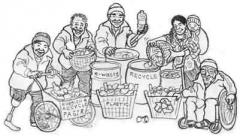Your progress
0%
complete
DPOs differ from self-help groups in that they have a wider base, often at national, regional or international level. Their main aim is to advocate for the rights of their members
DPOs formed in response to barriers that prevented the equal participation of people with disabilities in society.
See what a particularly successful disabled people’s organization has been able to achieve in the Ladakh region of India


Ladakh is a Himalayan region located in the north of India, where people live in small towns and villages at very high altitudes and in harsh conditions. Life is hard for everyone, but particularly for people with disabilities. While development initiatives are not new to the region, disability had never been considered in any development programme until the year 2000, when the Namgyal Institute for People with Disabilities (NIPWD) was established.
The focus of NIPWD was to ensure that:
People with disabilities have been at the forefront of many of the changes that have occurred in Ladakh. One of them is Mohammed Iqbal, president of PAGIR – the People’s Action Group for Inclusion and Rights, which was formed by people with disabilities in Ladakh in 2006. Iqbal spent the first 30 years of his life in an unproductive way, in bed at home, listening to music and chatting with friends, but by the time he was 45 years old (in 2008), he had become a successful business man and leader of PAGIR. He had had the courage to move away from the image of a “poor disabled person” to one of a person in control of his environment. Iqbal and his lobby group called the People’s Action Group for Inclusion and Rights (PAGIR) is a positive outcome of a seven-year community development process in Ladakh.
One of the key projects of PAGIR is a community managed garbage programme which creates income opportunities for more than 200 disabled people. Mohammad Iqbal says:
“Our garbage management programme, “Jungwa Shungskyob” in Ladakhi, started as a livelihood initiative for disabled persons; but has now moved on to handle a serious garbage problem in the city. We collect garbage in huge quantities, reuse, recycle them and give the cleaner environment back to the community. We still have a long way to go in handling the problem to its entirety, but have made a beginning … a beginning where disabled people are leading a garbage drive and generating employment for the larger community.”
NIPWD and PAGIR continue to work in the Ladakh region. PAGIR is now the key stakeholder in organizing people with disabilities,empowering them, and building their capacity to overcome poverty through its various income-generation activities. Mohammad Iqbal received the CNN-IBN“Real Hero Award”, in Mumbai on March 20th 2010, for PAGIR’s outstanding work towards creating an inclusive society.